Vaccine Protocol/Schedule for puppies and Dogs
VACCINATION NEWS FLASH
*I would like to make you aware that all 27 veterinary schools in North America are in the process of changing their protocols for vaccinating dogs and cats. Some of this information will present an ethical & economic challenge to vets, and there will be skeptics. As a breeder, its unfortunate to admit, I’ve seen vaccine deaths in puppies. Its the WORST thing to witness. Trust me. So this breeder had to do more research as more research on vaccines, in general, are being made public. This is my findings and recommendations:
Some organizations have come up with a political compromise suggesting vaccinations every 3 years to appease those who fear loss of income vs., those concerned about potential side effects. Politics, traditions, or the doctor’s economic well being should not be a factor in medical decision. But when we know some vaccines last SEVEN years–we need to dig further for truth and science.
NEW PRINCIPLES OF IMMUNOLOGY
“Dogs and cats immune systems mature fully at 6 months. If a modified live virus vaccine is given after 6 months of age, it produces an immunity which is good for the life of the pet (ie: canine distemper,parvo, feline distemper). If another MLV vaccine is given a year later, the antibodies from the first vaccine neutralize the antigens of the second vaccine and there is little or no effect. The titer is not “boosted” nor are more memory cells induced.” Not only are annual boosters for parvo and distemper unnecessary, they subject the pet to potential risks of allergic reactions and immune-mediated hemolytic anemia. “There is no scientific documentation to back up label claims for annual administration of MLV vaccines.” Puppies receive antibodies through their mothers milk. This natural protection can last 8-14weeks. Puppies & kittens should NOT be vaccinated at LESS than 8weeks. Maternal immunity will neutralize the vaccine and little protection (0-38%) will be produced. Vaccination at 6 weeks will, however, delay the timing of the first highly effective vaccine. Vaccinations given 2 weeks apart suppress rather than stimulate the immune system. A series of vaccinations is given starting at 8 weeks and given 3-4 weeks apart up to 16 weeks of age. Another vaccination given sometime after 6 months of age (usually at 1 year 4mo) will provide lifetime immunity. Check TITERS FIRST before administering any vaccine!
CURRENT RECOMMENDATIONS FOR DOGS
I have read studies showing immunity against challenge at 2-10 years for canine distemper & 4 years for parvovirus. Studies for longer duration are pending. “There are no new strains of parvovirus as one mfg. would like to suggest. Parvovirus vaccination provides cross immunity for all types.” Hepatitis (Adenovirus) is one of the agents known to be a cause of kennel cough. Only vaccines with CAV-2 should be used asCAV-1 vaccines carry the risk of “hepatitis blue-eye” reactions & kidney damage.**Bordetella Parainfluenza: Commonly called “Kennel cough” Recommended only for those dogs boarded, groomed, taken to dog shows, or for any reason housed where exposed to a lot of dogs. BOARDING KENNELS are accepting TITERS now, as they are losing revenue to ‘vax resistent’ pet parents now.
*RABIES There have been no reported cases of rabid dogs or cats in Harris, Montogomery or Ft. Bend Counties [Texas], there have been rabid skunks and bats so the potential exists. / It is a killed vaccine and must be given every year. CHECK TITERS BEFORE ADMINISTERING ANNUALLY!
**VACCINATIONS NOT RECOMMENDED**
Multiple components in vaccines compete with each other for the immune system and result in lesser immunity for each individual disease as well as increasing the risk of a reaction. Canine Corona Virus is only a disease of puppies. It is rare, self limiting (dogs get well in 3 days without treatment). Cornell & Texas A&M have only diagnosed one case each in the last 7 years. Corona virus does not cause disease in adult dogs.*
*Leptospirosis vaccine is a common cause of adverse reactions in dogs. Most of the clinical cases of lepto reported in dogs in the US are caused by serovaars (or types) grippotyphosa and bratsilvia. The vaccines contain different serovaars eanicola and ictohemorrhagica. Cross protection is not provided and protection is short lived. Lepto vaccine is immuno-supressive to puppies less than 16 weeks.
VACCINES NOT RECOMMENDED
NEW DEVELOPMENTS: Giardia is the most common intestinal parasite of humans in North America , 30% or more of all dogs & cats are infected with giardia. It has now been demonstrated that humans can transmit giardiato dogs & cats & vice versa. * Flagyl (Fenbendazole) takes care of it!
Heartworm preventative must be given year-round in Houston . IVERMECTIN CAN BE GIVEN MONTHLY FOR HEARTWORM AND ALL INTESTINAL PARASITES–WE RECOMMEND THE PASTE!
THE VIEW FROM THE TRENCHES; BUSINESS ASPECTS
Most vets recommend annual boosters and most kennel operators require them. For years the pricing structure of vets has misled clients into thinking that the inherent value of an annual office visit was in the “shots” they failed to emphasize the importance of a physical exam for early detection of treatable diseases. It is my hope that you will continue to require rabies & Kennel cough and emphasize the importance of a recent vet exam. I also hope you will accept the new protocols and honor these pets as currently vaccinated.
CONCLUSION
Dogs & cats no longer need to be vaccinated against distemper, parvo, & feline leukemia every year. Once the initial series of puppy or kitten vaccinations and first annual vaccinations are completed, immunity from MLV vaccines persists for life. You can always check titers before vaccinating to be sure your dog’s immunity is high.
The AAHA and all 27 veterinary schools of North America are our biggest endorsement for these new protocols.*
*Dr. Bob Rogers* Please consider as current on all vaccinations for boarding purposes.
DOGS Initial series of puppy vaccines
- distemper, hepatitis, parvo, parinfluenze – 3 sets one month apart concluding at 16 weeks of age.*
- Rabies at 16 weeks of age (later is better)
- Bordetella within last 4-6 months First annual (usually at 1 year and4 months of age)****Some vets will now check titers before vaccinating…many are not taking this route so we are not vaccinating when not needed.
- If you DO NOT WANT YOUR PUP VACCINATED, please let us know when placing your reservation as we will have to go over immunity boosting protocols as YOU are responsible for your pets health, and also responsible to ‘do no harm,’ as I am, as a breeder.
- NOSODES/Homeopathy: a homeopathic remedy that works the way vaccines are “supposed” to work: https://www.webmd.com/balance/what-is-homeopathy
- There are many books and online research available to you. But this book is one you could check out!


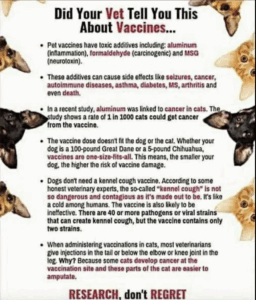
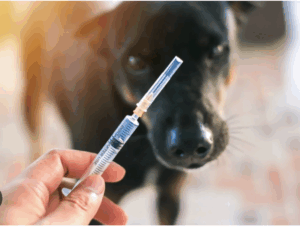
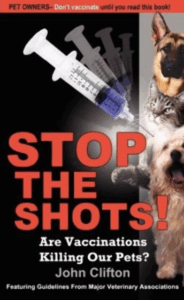





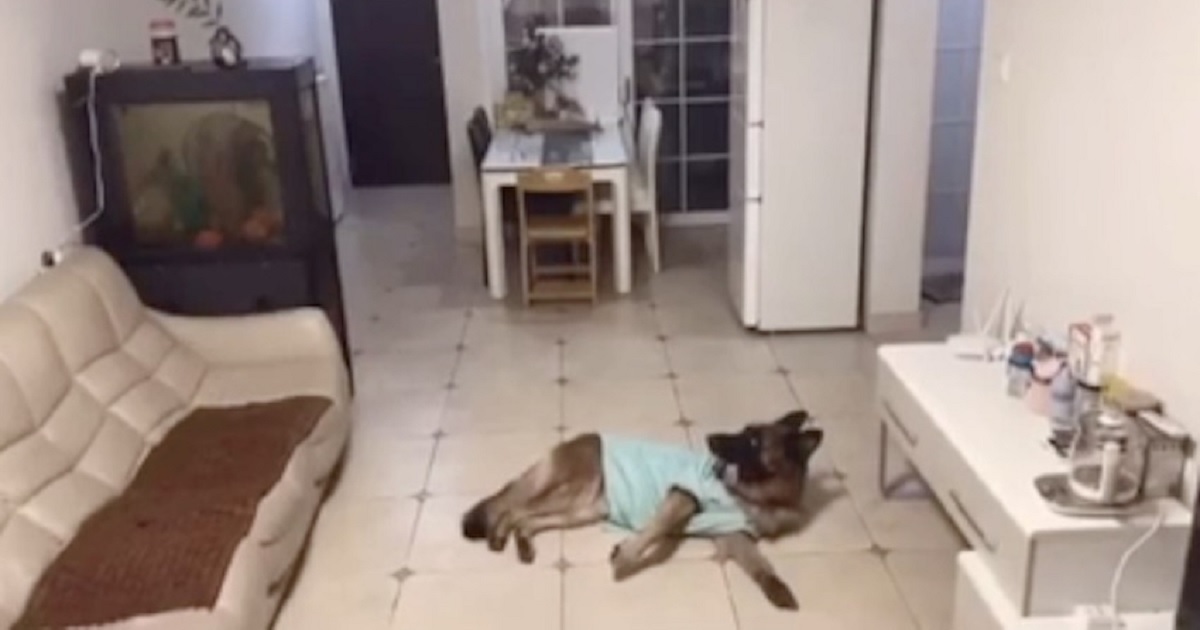





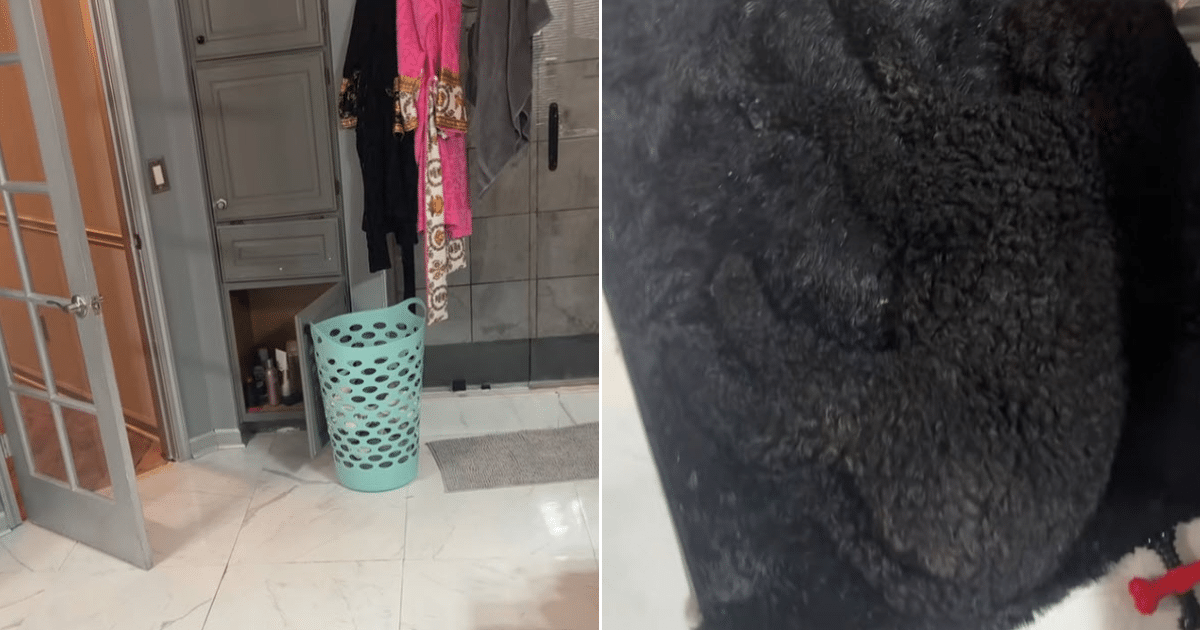






 English (US) ·
English (US) ·